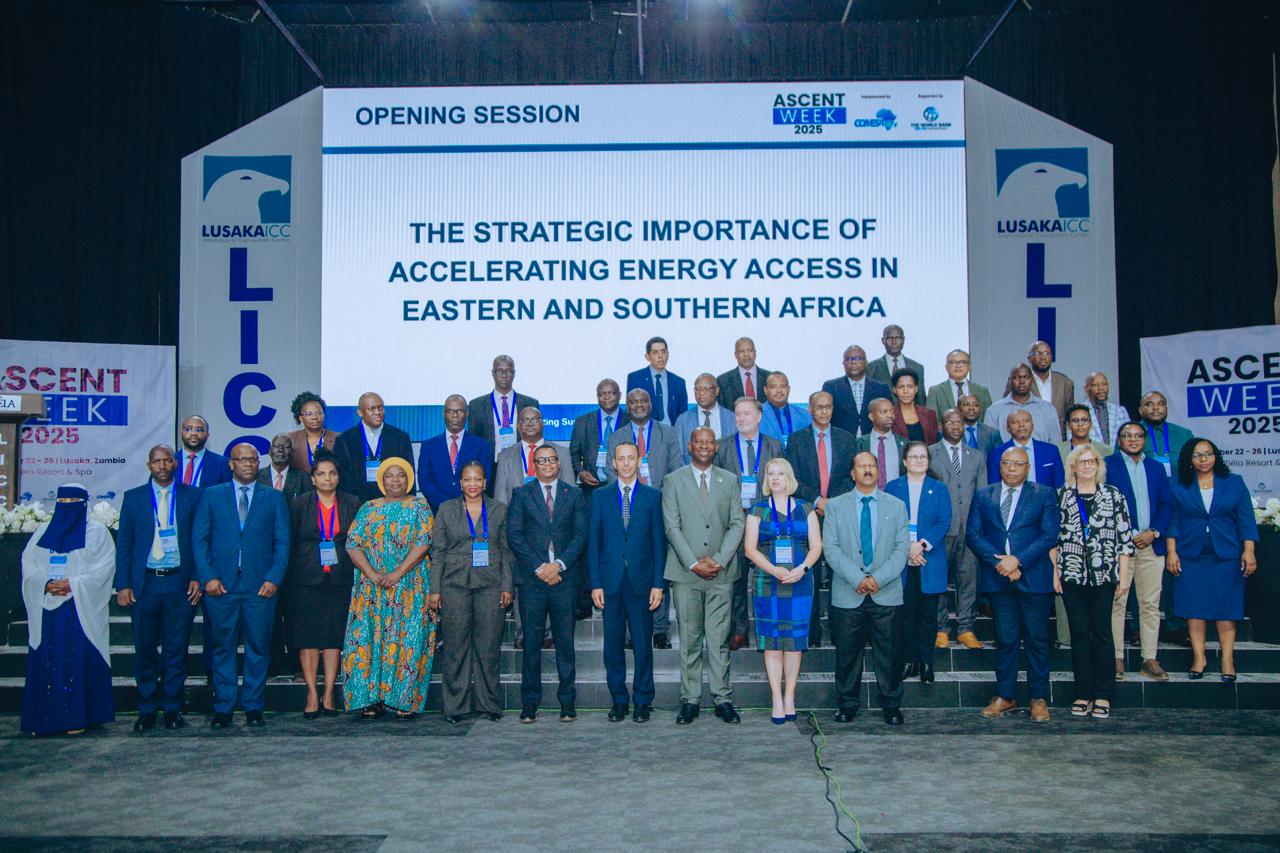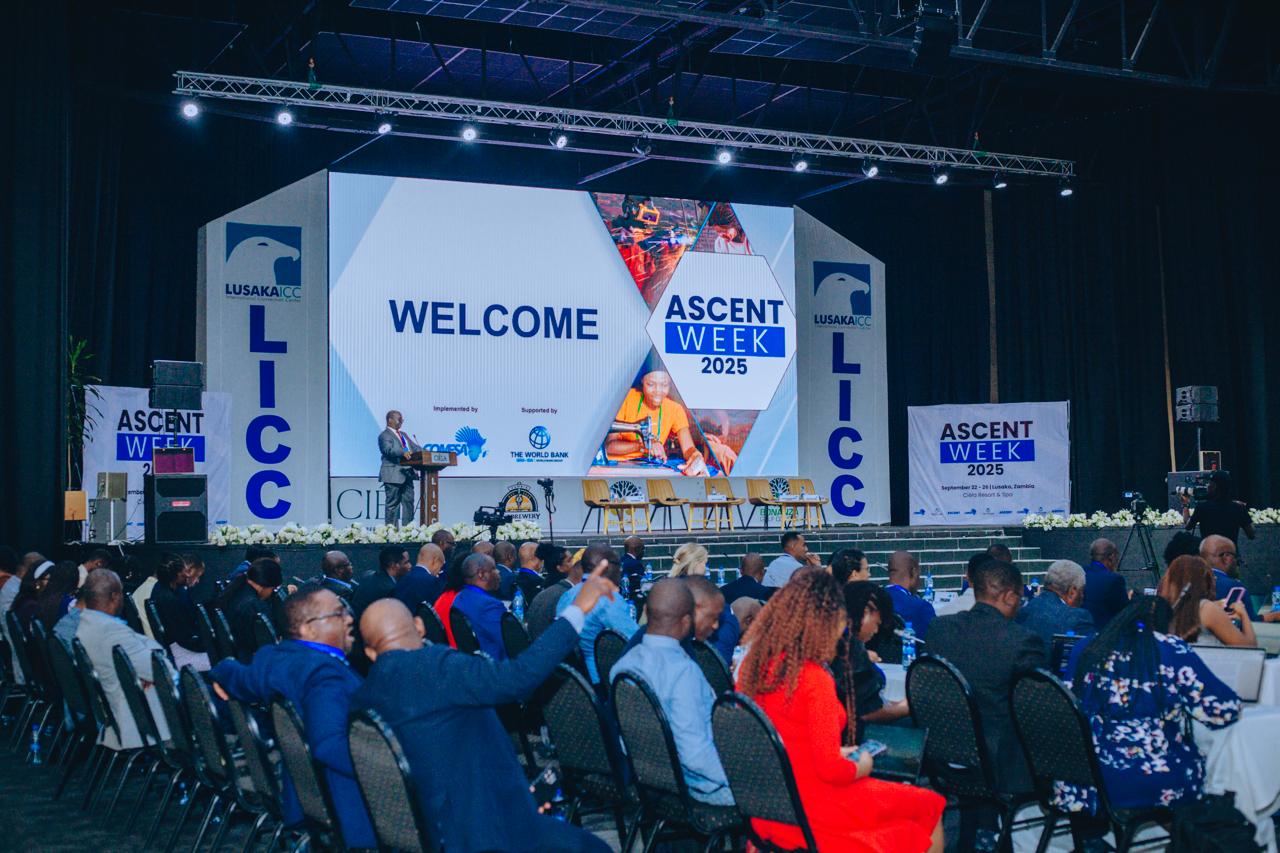Clean Energy Transformation
 Zambia Backs $5 Billion Regional Drive to Expand Clean Energy Access
Zambia Backs $5 Billion Regional Drive to Expand Clean Energy AccessBy Francis Maingaila
Lusaka, Zambia24 (22 September 2025) – Zambia has pledged its full commitment to the Accelerating Sustainable and Clean Energy Access Transformation (ASCENT) programme, a $5 billion initiative led by COMESA and the World Bank to electrify 100 million people across Eastern and Southern Africa by 2030.
Energy Minister Makozo Chikote, speaking at the official opening of ASCENT Week at Ciela Resort in Lusaka, described the programme as a decisive step toward addressing energy poverty and promoting sustainable development across the region.
“If we are to achieve universal energy access, we must work together to reduce the cost of clean energy technologies. Let us make clean energy not just available, but accessible,” Chikote told delegates.
He highlighted that Zambia’s electricity demand has grown over 6% annually, with installed generation capacity rising from 2,400 MW in 2015 to 3,873.8 MW today. Peak demand is expected to exceed 4,500 MW by 2030.
Despite these challenges, Zambia has made significant gains: national electricity access increased from 34% in 2021 to 54% in 2023, while rural access rose from 8% to 34%, underscoring the country’s commitment to achieving universal access by 2030.
Chikote noted that Zambia benefits from one of the highest solar irradiation levels in the region, averaging 5.5 kWh/m²/day, yet installed solar capacity remains below 400 MW.
He described this gap as an opportunity the country is determined to close, with ASCENT providing a technical and financial framework to expand renewable energy capacity significantly.
To make the transformation affordable, he called on development partners, financiers, and manufacturers to support concessional financing, bulk procurement, and local manufacturing of renewable technologies.
He also encouraged the private sector to invest, assuring that Zambia is reforming its energy policies to enhance transparency, predictability, and investor confidence.
“A solar farm in Zambia can power homes in Malawi. A wind turbine in Kenya can light up classrooms in Uganda,” Chikote said, urging cross-border cooperation.
“At the heart of this initiative are the millions across Eastern and Southern Africa who deserve light in their homes, energy for their economies, and renewed hope for a secure future.”
Ambassador Dr. Mohamed Kadah, Assistant Secretary General for Programmes at COMESA, emphasized the urgency of addressing the energy access crisis. Speaking at ASCENT Week, he noted that millions in Eastern and Southern Africa remain without reliable electricity or clean cooking solutions.
“Over 630 million people in our region live without electricity, while around 790 million depend on firewood and charcoal for cooking,” he said, highlighting the impact on forests, public health, and rural women and children.
Dr. Kadah warned that current progress is too slow to achieve universal energy targets. Utilities face underinvestment and financial strain, resulting in blackouts and rationing.
He stressed that Africa’s abundant solar and wind resources, along with falling renewable energy costs, present an opportunity to bypass fossil fuels. Off-grid solar systems and mini-grids, he added, could quickly connect remote communities.
“Policy reforms, stronger governance, and smarter energy strategies are needed to unlock investment and speed up delivery,” he said.
Launched last year, ASCENT is designed to expand grid and off-grid access, prepare bankable projects, and build institutional capacity, aligning with global goals on clean energy and gender equality. As implementing partner, COMESA coordinates ASCENT across member states, mobilizing investment and ensuring inclusivity.

“The energy gap is one of our greatest vulnerabilities, but closing it is also one of our greatest opportunities,” Dr. Kadah said.
“One year from now, communities should see real improvements—light in homes, power for businesses, and a stronger sense of hope.”
Ms. Yadviga Semikolenova, World Bank Energy Practice Manager for Eastern and Southern Africa, called on African countries to double the pace of electricity connections to meet the 2030 goal of providing power to 300 million people under Mission 300.
“The program has already enabled 30 million people to gain access to electricity in its first year, about 10 percent of the overall target,” she said.
“This is a connection rate one and a half times faster than in previous years. But 2030 is not far away, so the pace needs to be doubled.”
ASCENT now covers 11 member countries, supporting grid expansion, distributed renewable energy, and fundraising for clean energy projects, including climate and carbon finance. Semikolenova emphasized that progress requires reforms, innovation, and stronger institutions.
She highlighted National Energy Compacts—government strategies to attract investment and expand access—as key drivers, with 12 African countries having launched such compacts and 17 more expected to do so during the UN General Assembly.
She also cited the Trade and Development Bank’s financing of Ignite Energy Access and Burn Manufacturing, which will deliver clean energy and cooking solutions to four million people within a year while creating jobs.
“Closing Africa’s energy gap is within reach if we build on these partnerships,” she said, calling ASCENT a growing family of governments, partners, and private sector actors committed to results.
Dr. Dev Haman, COMESA Assistant Secretary for Finance and Administration, highlighted the region’s dependence on fossil fuels, vulnerability to volatile energy costs, and exposure to climate change.
> “Our industries face high energy costs, rural communities remain largely off-grid, and our economies are exposed to external shocks,” he said.
“Yet, the region has abundant solar, wind, hydro, and geothermal potential that must be harnessed quickly and sustainably.”
Dr. Haman outlined five strategic priorities for ASCENT’s success: harmonizing policies, expanding infrastructure, engaging private capital, building technical capacity, and ensuring inclusive access, especially for women, youth, and vulnerable populations.
He stressed that ASCENT is not an end but a means to economic growth, social equity, regional unity, and environmental stewardship.
Green Economy and Environment Minister Mike Mposha, speaking on behalf of Chikote at the launch in Chongwe, reaffirmed Zambia’s commitment to ASCENT while cautioning that high costs of renewable technologies remain a barrier.
“We must reduce the costs of solar panels, wind turbines, and storage systems. I call upon development partners, manufacturers, and financiers to innovate not just in technology but also in pricing through concessional financing, bulk procurement, and local manufacturing.”
Mposha highlighted Zambia’s readiness to lead by example in bridging the energy gap through reforms and strategic partnerships. He confirmed that Zambia is expected to launch its ASCENT project in the coming week.
Hosted at Ciela Resort, Lusaka, ASCENT Week 2025 runs from 22–26 September 2025, convening over 400 high-level stakeholders including policymakers, technical experts, financiers, and investors.
The event focuses on raising awareness on ASCENT implementation, accelerating results and impact, sharing emerging good practices across countries, highlighting COMESA’s role in supporting national efforts, and defining next steps for program rollout.
“ASCENT Week 2025 is a pivotal moment for our region,” said Dr. Kadah.
“It is not just about energy access—it’s about unlocking opportunity, empowering communities, and building resilient economies.”
The week-long event features technical workshops, policy dialogues, and interactive sessions, emphasizing innovation, digital tools, and regional collaboration to accelerate clean and affordable energy access across Eastern and Southern Africa.



Comments
Post a Comment